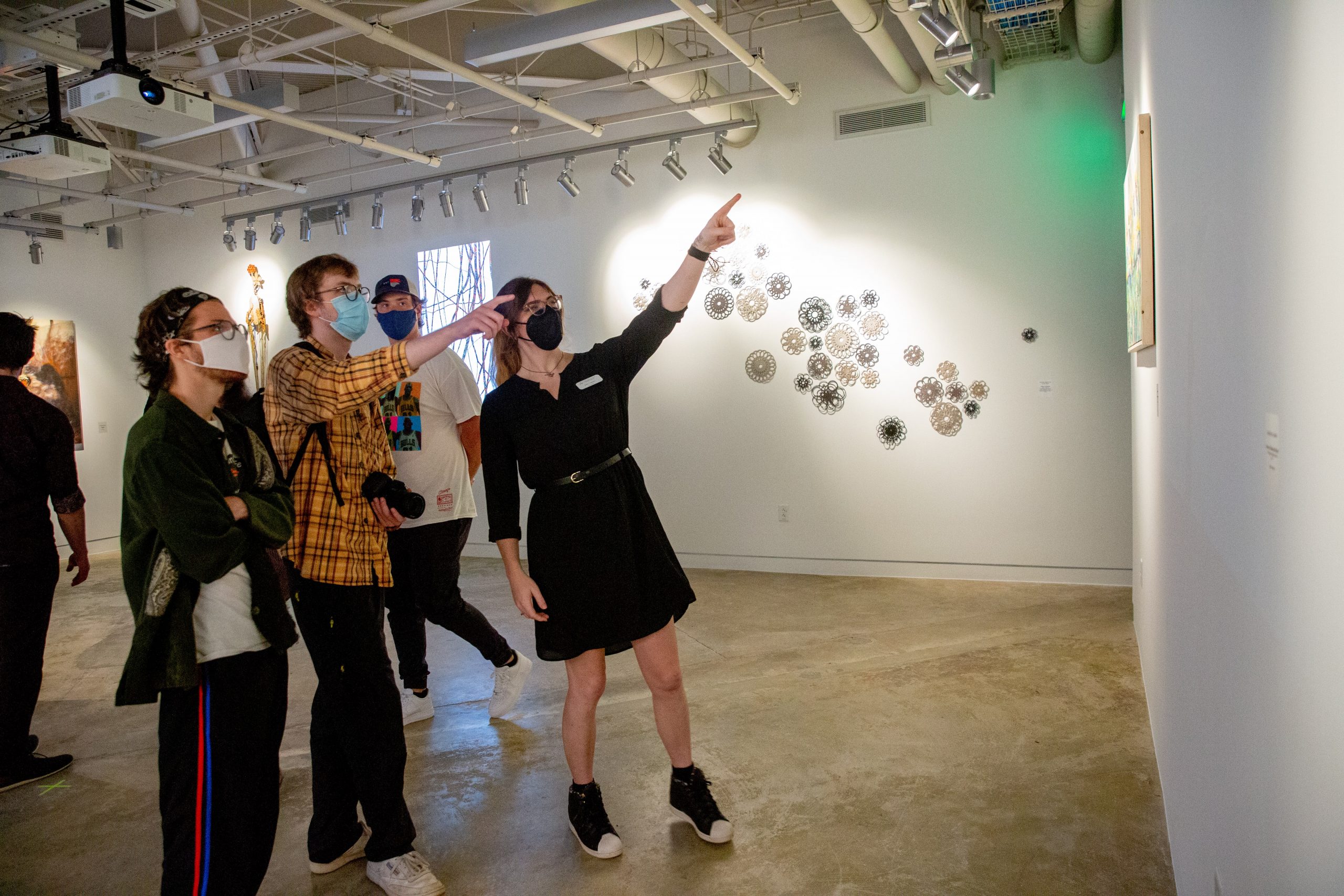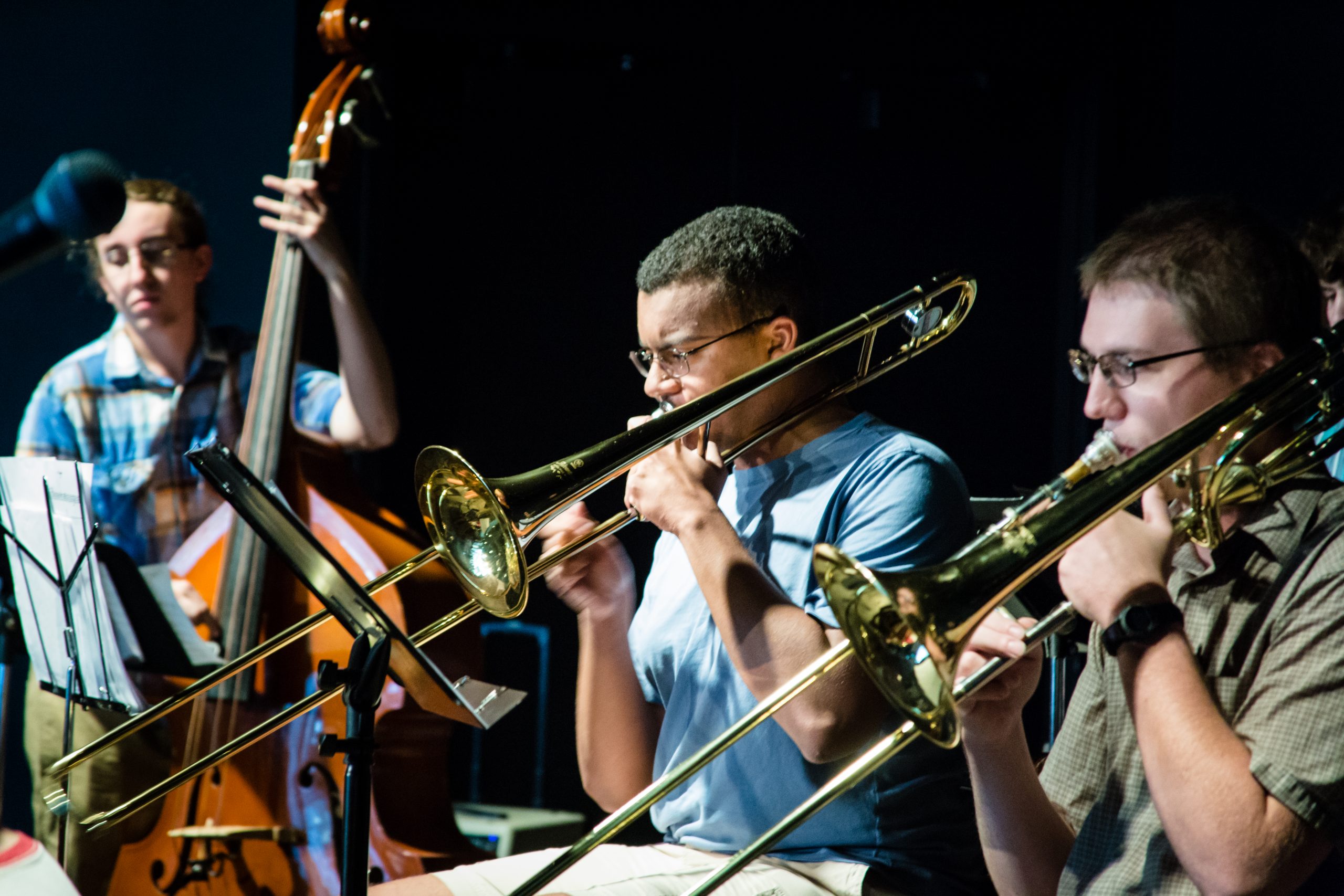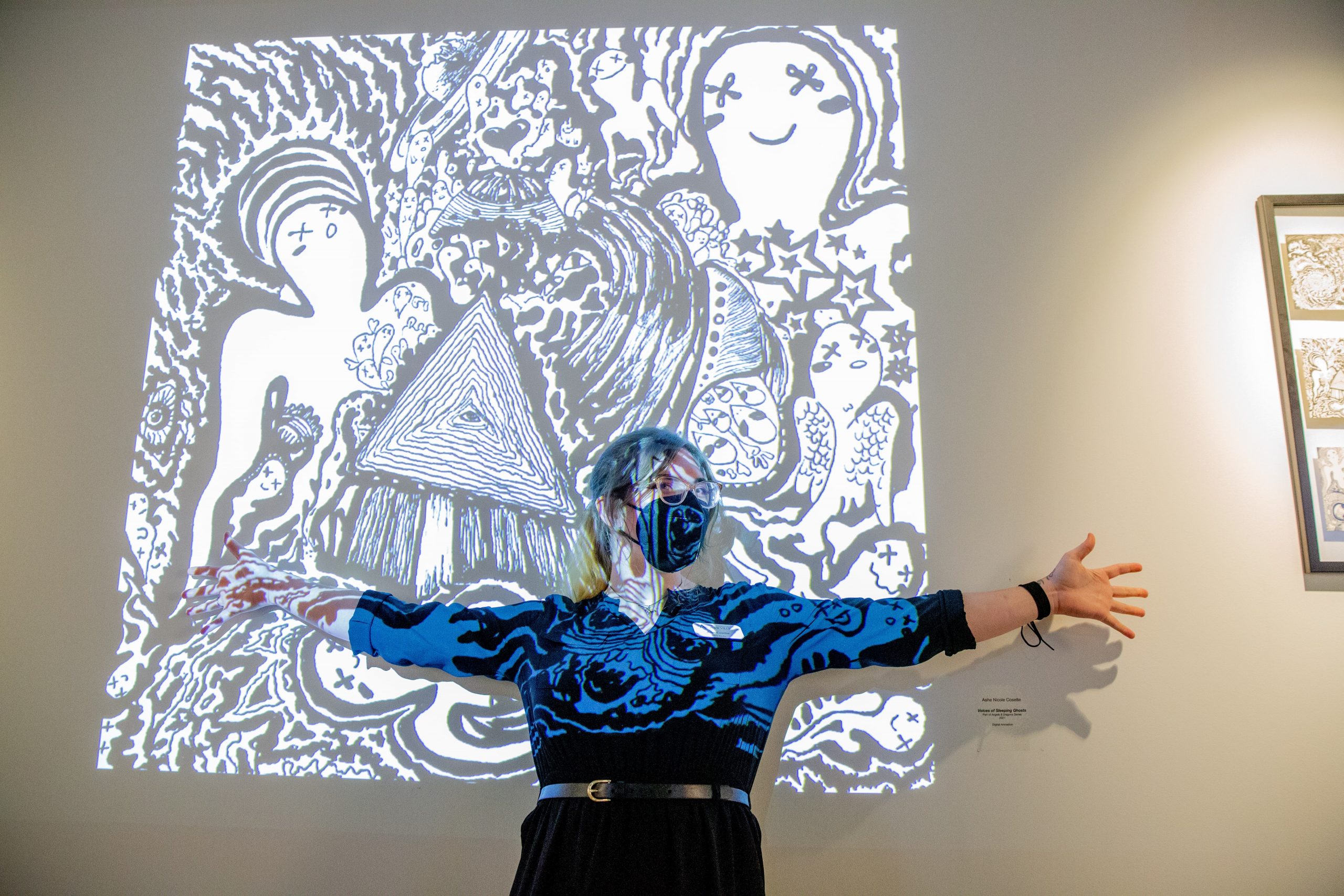Welcome to Visual & Performing Arts
ARTS courses examine the significance of the arts in the human experience, the cultural context of creative composition and performance, the foundations of aesthetic values, and the communicative function of the arts.
All UNC Asheville students must take 3.0 credits of ARTS, or LAC (Liberal Arts Core) courses designated as approved ARTS courses, before they graduate.
View a comprehensive list of ARTS courses here.
Our increasingly complex and interdependent world needs critical thinkers with strong problem-solving skills who are able to address the long-term viability of social-ecological systems. The Interdisciplinary Certificate in Sustainability seeks to give students a broad understanding of environmental, socioeconomic, and humanistic systems through interdisciplinary academic preparation, community engagement, and cross-campus collaboration so that they can help develop local and global solutions for a sustainable future.
Contact
Dr. Casey King
Director of Sustainability
Lecturer in Environmental Studies
cking10@unca.edu
Preparation for doctoral level and other professional programs in health care is available at UNC Asheville. Students can major in the natural sciences, social sciences, and traditional humanities disciplines; or they may transcend traditional disciplines and create their own individual degree program. At UNC Asheville we believe that an undergraduate liberal arts education, coupled with a strong research component, is the best foundation for advanced studies in the health professions. Students need breadth, depth of knowledge, and experience in order to better understand their patients and relate to their peers in the chosen health profession.

UNC Asheville’s Humanities Program explores what it means to be human. We examine the human experience by looking at what we’ve achieved in our several thousand years of recorded history, including our diverse values and beliefs, and how these concerns and passions influence our time. Humanities courses aren’t just about history; they draw together faculty and subject matter across subjects including history, literature, philosophy, religion, natural science, social science and fine arts. Humanities helps us make educated and ethical decisions as we strive to solve problems and make progress as a civilization.
The Humanities Program encourages and equips students to engage the complexity of the world that we live in, and this has value not only personally, but also for their profession and civic lives.
Students take three Humanities courses, usually one each year, and choose between two senior capstone experiences.
A Hallmark of UNC Asheville
For 50 years, the Humanities Program has been the cornerstone of UNC Asheville’s liberal arts curriculum. The program has achieved nationwide recognition by the National Endowment for the Humanities, the Association of American Colleges and Universities, Fiske Guide to Colleges, The Princeton Review and U.S. News and World Report.
Most schools have general education requirements that are somewhat random. Everyone, no matter their major, takes a math, science, and English class. But, we don’t think that’s enough. UNC Asheville’s Liberal Arts Core is a set of courses designed to expose our students to a range of subjects and ideas and help them apply that knowledge to their own major. We even have a course that introduces all first-year students to education in a liberal arts environment so you can be set up for success. It’s not just what you’re learning, but how you learn, that makes our students so successful after they graduate.
Students of all majors are required to complete the following:
| Requirement | Credits |
| First-Year Seminar | 3 |
| Academic Writing and Critical Inquiry | 4 |
| Humanities | 12 |
| Laboratory Science | 4 |
| Scientific Perspectives | 3 |
| Quantitative Perspectives | 4 |
| Social Science | 3 |
| Second Language (proficiency through the 2nd semester) | 0-4 |
| Arts and Ideas | 3 |
| Senior Capstone | 4 |
| |

Humanities

Arts & Ideas

Interdisciplinary Approach to Ethics
UNC Asheville's Ethics and Social Institutions Program is designed to enable students to examine and evaluate social issues from interdisciplinary perspectives. Participating students will learn about economic, political and cultural institutions and the relationships between them. By examining markets, governments and community organizations, students will learn about decision-making processes and be able to determine their ethical implications and the outcomes of social choice.
The interdisciplinary concentration in Ethics and Social Institutions can lead to careers or advanced study in law, business, and government, or more specialized academic disciplines at the graduate level.
What You'll Learn
Students in UNC Asheville's Ethics and Social Institutions Program (ESI), under the guidance of the director of interdisciplinary studies, design their own individualized course of study by drawing on many disciplines including but not limited to economics, philosophy, political science, management, mass communication, psychology and sociology.
This personalized program allows each student to develop a course of study consistent with individual interests, while at the same time, investigating a specific set of social/political institutions. Thematic possibilities could include:
- Social/Political Ethics
- Ethics, Society, and the Law
- Political and Social Decision-making
- Globalization and the Individual
- International Political Economy
- Interaction of Societies
- The Individual and Society
- Economic Power in American Society
The requirements for the B.A. in Interdisciplinary Studies with a concentration in Ethics and Social Institutions include an introductory course - ESI 101 and PHIL 200 (Introduction to Ethical Theories) - as well as courses in social science research methods, ESI 490 (Senior Research in Ethics and Social Institutions), and choices from many elective courses.
Contact Information
Melissa Burchard
Professor of Philosophy
Director of Ethics and Social Institutions
236 Whitesides Hall
mburchar@unca.edu
828-232-2990

The Interdisciplinary Certificate in Food, Food Systems and Culture focuses on developing the student as an informed consumer of food by providing a platform for discussion of what we eat, why we eat, where our food comes from and its journey from production to consumption, and how food affects our bodies, health and lives.
Certificate Requirements
The Food, Food Systems and Culture Certificate requires the completion of a minimum of 4 courses and 12 semester hours as follows. All courses used for the certificate must be completed at UNC Asheville. The certificate may only be completed in conjunction with the completion of an undergraduate degree at UNC Asheville.
At least one course must be chosen from the listing of Food-focused courses. Food-focused courses have food, food systems or food culture as a central theme and consistently offer students an intentionally interdisciplinary experience (e.g. cross-course project or other high impact pedagogical practice). The remaining three or more courses may be chosen from Food-focused or Food-related courses, following the distribution guidelines required of all interdisciplinary certificates. Other courses may be substituted with approval of the certificate coordinator.
Sample courses include Plants and Humans (biology), The Food of Chemistry, Food Politics and Nutrition Policy, and Pathophysiology of Chronic Conditions and Illnesses.
Interdisciplinary certificates may only be completed in conjunction with the completion of an undergraduate degree at UNC Asheville.
The Certificate in Contemplative Inquiry focuses on creating opportunities for greater inquiry, connection, reflection, insight, and communication. It does so by nurturing and supporting students’ practical and critical first-person experience and inquiry through the use of varied contemplative practices, including mindfulness techniques, meditation, focused thought exercises, beholding, deep listening, reflective writing, contemplative movement, and dialogue.
Contact
Dr. Christine Boone
Coordinator, Interdisciplinary Certificate in Contemplative Inquiry & Associate Professor of Music
cboone@unca.edu

Who We Are
With daily one-on-one guidance from full-time faculty members, UNC Asheville’s Department of Physics is a great place to study the laws that make the world go around, including time, space, force, matter, motion, and energy. Our faculty are passionate about their research in molecular, atomic, nuclear, and environmental physics, along with astronomy and astrophysics. Whether you’re hanging out in the physics study lounge or you’re a member of our award-winning chapter of the national physics honors society, Sigma Pi Sigma, it’s easy to feel at home in our close-knit department.
What You’ll Learn
Physics majors become expert critical thinkers. Along with gaining a strong knowledge base in mathematics, chemistry, computer science, astronomy, and fundamental engineering, you’ll test theories, conduct experiments, and solve problems—skills that apply to a broad range of fields. Physics majors are encouraged to customize their curriculum according to their interests and goals, and many participate in UNC Asheville’s nationally-recognized undergraduate research program. The astronomy minor is also popular; at UNC Asheville’s Lookout Observatory, astronomy faculty and students guide visitors as they explore the skies. Our graduates are prepared for graduate study or immediate, successful careers in science, engineering, medicine, law, business, education, and more.
Our Commitment to Diversity, Equity, and Inclusion
The Department of Physics and Astronomy at UNC Asheville believes that diverse perspectives and lived experiences enrich and strengthen both our educational and scientific work. Our faculty and staff aim to create an equitable, inclusive, and supportive environment for all. We acknowledge the underrepresentation of individuals from diverse groups in both the fields of physics and astronomy and that this underrepresentation is the result of systemic historical and ongoing bias in the culture at large, the academic community, and other professional organizations. We believe that it is our responsibility to actively help overcome these biases.

Who We Are
The Bachelor of Science in Music Technology combines music engineering and production, music theory and performance, mathematics and computer science, music business, and electronics. Students learn how to operate a recording studio, use recording and mixing consoles and digital audio workstations, sound reinforce and record live concerts, build and solder electronic circuits, and professionally mix and record music. Students and graduates put those skills to use in internship and work opportunities at local studios, live sound venues and production companies, and audio equipment manufacturers.
What You’ll Learn
The core music technology courses will cover use of microphones, mixing consoles and signal processors, digital audio and MIDI, Pro Tools, digital and analog tape recording, live sound reinforcement and on-location recordings, Dolby Atmos and ambisonic immersive audio recordings and mixing, audio postproduction for film and video, electronic music composition, audio electronics, acoustics, and synchronization.
Auditions for Prospective Music Majors
All prospective music majors are required to audition. Please visit our Auditions page for upcoming auditions and more information.















